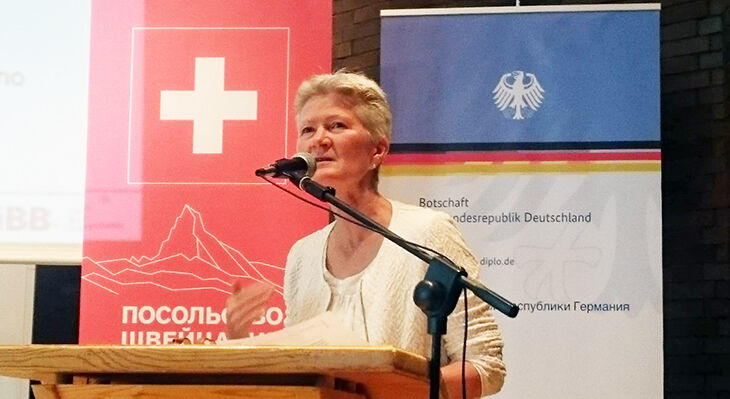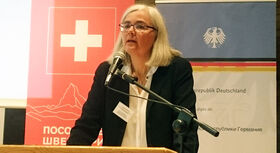The long journey of vocational orientation in Russia
Choosing the right career entails a complex development process – from an individual, social, economic and governmental viewpoint. The third vocational education and training conference of the German Embassy in Moscow on 16 September investigated how Russia is structuring this process.

At the third vocational education and training conference, Russian decision-makers shared ideas on vocational orientation in vocational education and training. The event received around 150 participants from Russian public administration, German and Russian companies, vocational schools and technical colleges. Speakers from Germany, Austria and Switzerland provided international experience in vocational orientation.
In her talk, Kirsten Vollmer from the Federal Institute for Vocational Education and Training (BIBB) reported on measures and mechanisms of inclusion and vocational education and training. She explained that “access to professions is promoted in order to enable individual support with qualified training.”

Stefanie Langen from the Confederation of German Employers' Associations (BDA) looked at how to engage employers, emphasising that the SCHULEWIRTSCHAFT network provides a powerful instrument for organising cooperation arrangements between schools and businesses at local, regional and federal level. Referring to the ‘Berufswahl-SIEGEL’ network, she stressed the importance of quality assurance in vocational orientation measures. Last but not least, Langen highlighted the contribution of employers towards financing and steering the Federal Employment Agency, where around 5,000 careers advisers in 156 employment agencies work on vocational orientation.
It became clear at the conference that vocational orientation is a journey requiring many advisory sessions, experience sharing and discussions with various stakeholders to answer questions such as: How can the state, schools, companies and social partners cooperate with regard to vocational orientation? What role do parents play in vocational orientation? And how is vocational orientation for adults structured?
A vital component of advisory service
Russia intends to increase its investment in vocational orientation in the future and has already made a start in some areas. Examples here include the regional model for vocational orientation work in Jaroslawl, St. Petersburg and Krasnoyarsk and the federal “Ticket to the future” programme. What the country lacks, however, is data, a concerted strategy and integration of vocational orientation into the vocational education and training system. For this reason, vocational orientation has become a vital component of advisory services for Russia in the context of bilateral cooperation.
The German Embassy in Moscow organised the conference together with AHK Moskau (the German-Russian Chamber of Commerce in Moscow) and FIRO RANHIGS (the Federal Institute for Education Development). GOVET initiated and organised the participation of speakers from Germany and led a workshop to discuss the role of careers advisers.
GOVET is providing specialist support for bilateral cooperation with Russia on behalf of the Federal Ministry of Education and Research (BMBF). To mark Girls’ Day in March 2019, GOVET organised a study trip on the topic of vocational orientation. In the Cologne area, Russian experts from regional methods centres, universities, administrative bodies and businesses learnt about the instruments used for vocational orientation in Germany.